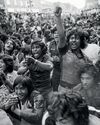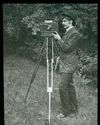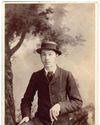
A resounding applause fills The Four Corners Gallery and Arts Centre dedicated to independent photography and film-making. Fifty or so people have travelled from across the country to east London to see and hear photographer Mike Abrahams speak about his new book, This Was Then (Bluecoat Press 2024). Abrahams doesn’t take questions and politely directs people towards the complimentary bar. Surveying the dispersing crowd I spot renowned picture editors, archivists, publishers, editors and photographers. They are of an age and of a time. This Was Then is a collection of Abrahams’ photography from 1973 to 2001, through Prime Ministers Heath, Wilson, Callaghan, Thatcher, Major to Blair. It was his time and his visual contribution to this era of British history.
Born in South Africa, Abrahams left aged two and grew up in Liverpool, UK, where he began taking pictures as a teenager as a way to explore his surroundings. ‘In 1971, as a 19-year-old, I worked on ambulances, taking the elderly and disabled to day centres. Entering some of the last occupied houses in condemned streets awaiting demolition was shocking and it was to some of these streets that I returned later with my camera,’ he writes in the introduction to This Was Then.
During the afternoon I spent listening and chatting to Abrahams, it’s evident he’s moulded by the bomb-damaged, slum-ridden, impoverished environment of his youth. Driven by an unwavering curiosity, decades of wandering British streets to see what’s around the corner and behind doors of those living day to day in marginalised societies has followed – Blackburn, Bradford, Barrow-inFurness, London, Liverpool and Glasgow.
This story is from the September 03, 2024 edition of Amateur Photographer.
Start your 7-day Magzter GOLD free trial to access thousands of curated premium stories, and 9,000+ magazines and newspapers.
Already a subscriber ? Sign In
This story is from the September 03, 2024 edition of Amateur Photographer.
Start your 7-day Magzter GOLD free trial to access thousands of curated premium stories, and 9,000+ magazines and newspapers.
Already a subscriber? Sign In

Calling The Shots: A Queer History of Photography
Offering an unprecedented view of photographic history through a queer lens, this is a wonderful and powerful book, says

Large-aperture standard zoom, too
SONY has also revealed a new premium standard zoom, the FE 28-70mm F2 GM.

Super-fast, high-res Sony Alpha Ai II
SONY has announced its new professional full-frame flagship camera, the Alpha A1 II.

39 awesome accessories
Our round-up of the best accessories we've used and reviewed this year, along with some old favourites. There's something here for every budget, starting from just £7, including tripods, bags, filters and much more

Such a thing as society
This autumn sees the launch of a major new book and exhibition devoted to examining the multiplicities of photography during 1980s Britain. Peter Dench finds out more

Join Club
The sociable Canvey Island Photographic Club is keen to grow its in-person meet ups

Capturing flight
Winners and finalists of Bird Photographer of the Year share their tips for success with Hollie Latham Hucker

140 years of change
AP has become the world’s oldest surviving consumer photo magazine because we have moved with the times, says Nigel Atherton

Preserving history in platinum
A deep dive into the meticulous art of platinum printing, and the collaboration between the Royal Geographical Society and Salto Ulbeek. Mike Crawford explores how they brought historical photographs to life with enduring beauty and precision

Life in the past lane
What was life like for an amateur photographer in 1884? John Wade takes a trip back in time